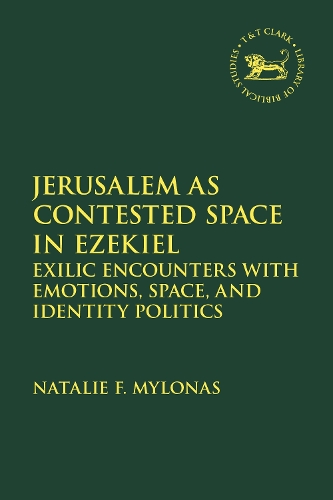
Jerusalem as Contested Space in Ezekiel: Exilic Encounters with Emotions, Space, and Identity Politics
(Paperback)
Available Formats
Publishing Details
Jerusalem as Contested Space in Ezekiel: Exilic Encounters with Emotions, Space, and Identity Politics
By (Author) Natalie Mylonas
Bloomsbury Publishing PLC
T.& T.Clark Ltd
23rd January 2025
United Kingdom
Classifications
Professional and Scholarly
Non Fiction
Religious aspects of sexuality, gender and relationships
Criticism and exegesis of sacred texts
224.406
Physical Properties
Paperback
206
Width 152mm, Height 232mm, Spine 14mm
320g
Description
Natalie Mylonas uses Ezekiel 16 as a case study in order to reveal the critical relationship between space, emotion, and identity politics in the Hebrew Bible. Drawing on interdisciplinary research that emphasises how space and emotions are inextricably linked in human experience, Mylonas explores the portrayal of Yhwhs wife, Jerusalem, in Ezekiel 16 as a personified city who feels emotion. She foregrounds purity and gender issues, as well as debates on emotions in the Hebrew Bible, emphasising that spatiality is a key component of how these issues are conceptualised in ancient Israel. This book argues that the power struggle between Jerusalem and Yhwh in Ezekiel 16 is a struggle over the contested space of Jerusalems body and the city space. Jerusalems emotions are in a dynamic relationship with the spaces in the text they are signified by these spaces, shift as the constitution of the spaces shifts, and are shaped by Jerusalems use of space. Her desire, pride, and shamelessness are communicated spatially through her use of city space, while her representation as disgusting is underscored by her uncontrollable female body. Mylonas concludes by showing how Ezekiels vision of the new Jerusalem in Ezekiel 40-48 re-establishes sacred space through the erasure of the feminine city metaphor coupled with strict boundary policing, which is a far cry from the assault on Jerusalems boundaries described in Ezekiel 16.
Author Bio
Natalie Mylonas is Sessional Academic at the Australian Catholic University and Honorary Researcher at Macquarie University, Australia. She is Fellow of the Higher Education Academy and a member of the Macquarie University node of the Australian Research Council Centre of Excellence for the History of Emotions.
